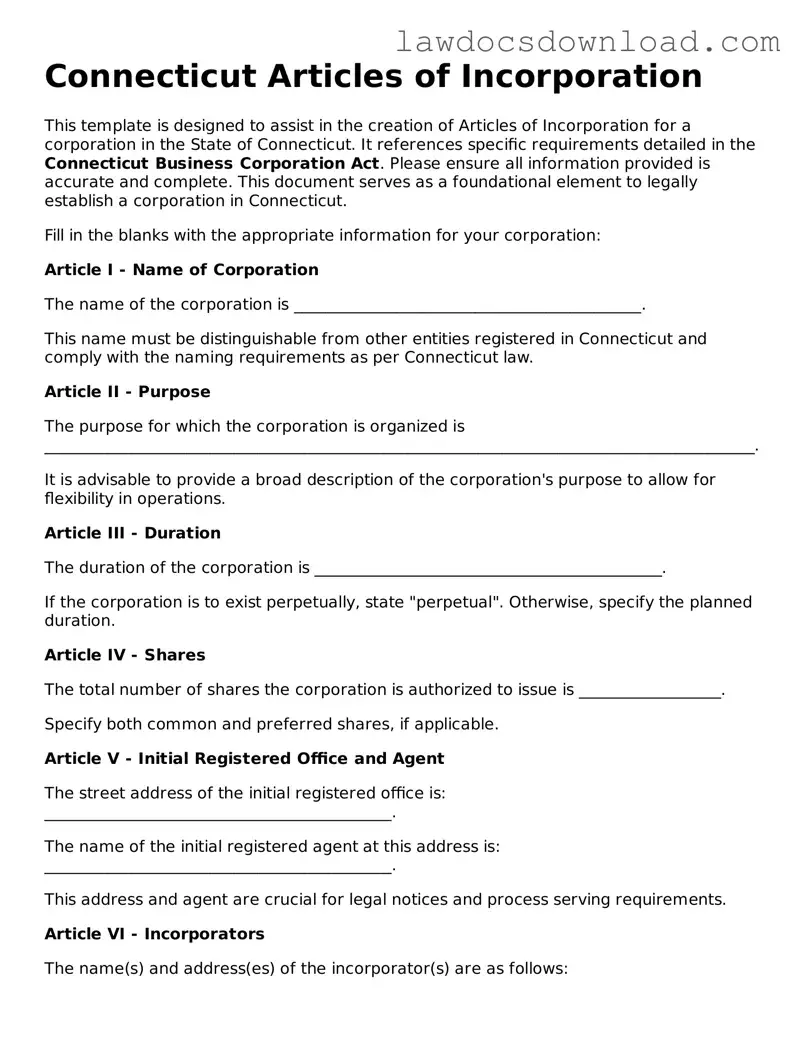Connecticut Articles of Incorporation
This template is designed to assist in the creation of Articles of Incorporation for a corporation in the State of Connecticut. It references specific requirements detailed in the Connecticut Business Corporation Act. Please ensure all information provided is accurate and complete. This document serves as a foundational element to legally establish a corporation in Connecticut.
Fill in the blanks with the appropriate information for your corporation:
Article I - Name of Corporation
The name of the corporation is ____________________________________________.
This name must be distinguishable from other entities registered in Connecticut and comply with the naming requirements as per Connecticut law.
Article II - Purpose
The purpose for which the corporation is organized is
__________________________________________________________________________________________.
It is advisable to provide a broad description of the corporation's purpose to allow for flexibility in operations.
Article III - Duration
The duration of the corporation is ____________________________________________.
If the corporation is to exist perpetually, state "perpetual". Otherwise, specify the planned duration.
Article IV - Shares
The total number of shares the corporation is authorized to issue is __________________.
Specify both common and preferred shares, if applicable.
Article V - Initial Registered Office and Agent
The street address of the initial registered office is:
____________________________________________.
The name of the initial registered agent at this address is:
____________________________________________.
This address and agent are crucial for legal notices and process serving requirements.
Article VI - Incorporators
The name(s) and address(es) of the incorporator(s) are as follows:
- Name: _________________________, Address: ___________________________________________
- Name: _________________________, Address: ___________________________________________
These are the individuals responsible for executing these Articles of Incorporation.
Article VII - Directors
The corporation will be managed by a Board of Directors. The names and addresses of the individuals who will serve as the initial directors until the first annual shareholders' meeting or until their successors are elected and qualify are:
- Name: _________________________, Address: ___________________________________________
- Name: _________________________, Address: ___________________________________________
Ensure that the directors meet any requirements set forth by Connecticut laws.
Article VIII - Principal Office
The street address of the principal office of the corporation is:
____________________________________________.
This may or may not be the same as the registered office.
Article IX - Additional Provisions
Any additional provisions deemed necessary for the management of the corporation or required by Connecticut law can be listed here:
__________________________________________________________________________________________.
This might include indemnification of directors, preemptive rights, and any other provisions not inconsistent with state law.
Ensuring that this document complies with the laws and regulations of the State of Connecticut is critical. It is recommended to seek legal advice or consult with an attorney to verify the completeness and accuracy of these Articles of Incorporation before filing with the Connecticut Secretary of State.

